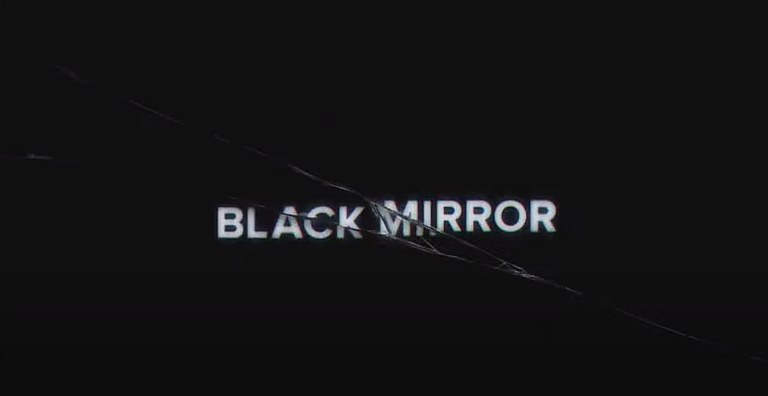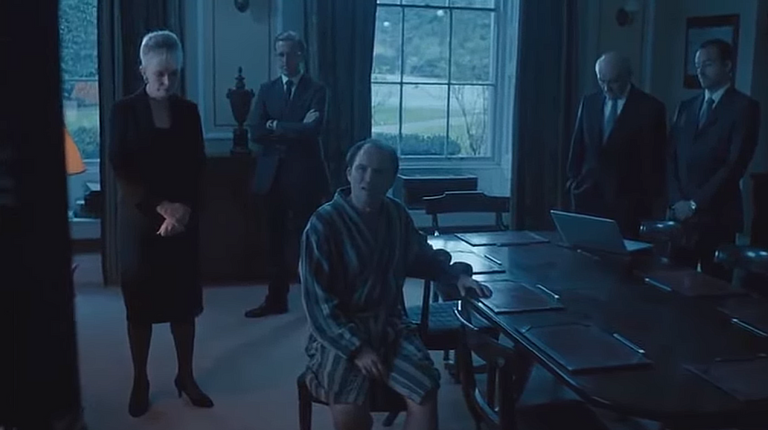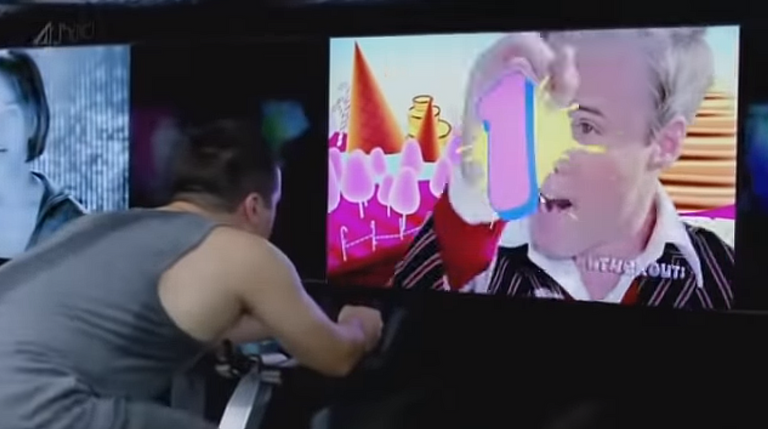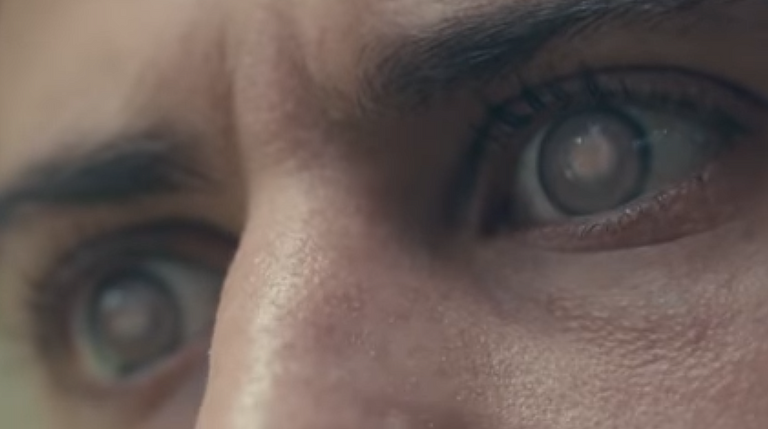[FR - ENG] Black Mirror - S01

[ENG]
Simplifying to the extreme, there are at least two major types of Science Fiction. There is the one where the great space epics fall (Star Trek, Battlestar Galactica, Asimov's cycles...), and the 'European' one, more philosophical than adventurous, dear to Bradbury, Ballard, Orwell. First aired in December 2011 in Great Britain, Black Mirror represents an example of the best TV science fiction belonging to the second type, the one more concerned with human problems than space travel. The series maintains a clearly identifiable common theme: the negative implications of technology, the addiction caused by it and its effects on individuals and society.
The author is Charlie Brooker, a prominent British television critic and screenwriter, who became quite famous for Dead Set, a tale of a zombie apocalypse from the point of view of reality show contestants. His ironic and highly satirical style (which has cost him no small amount of trouble in his career) is also partly reflected in this work, which is imaginative, original, dystopian, full of genre references and permeated by an extreme sense of the grotesque that Philip K. Dick would love.
Each of the 6 episodes (divided into 2 seasons of 3 episodes each) is only thematically related to the others, while the cast and plot change each time.

The series opens The National Anthem. This first episode is undoubtedly the most baffling of the 3 in the first season. A punch to the viewer's skull. Susannah, the best-loved British princess since Lady D, is kidnapped a few days after announcing her own wedding; the Prime Minister must personally 'pay', on live TV, a kind of sadistic ransom in kind to free her.

"Fifteen Millions of Merits" presents a hypothetical future in which men live indoors in collective environments with no contact with the outside world, doing only one activity: pedaling on exercise bikes to produce energy, in front of a screen that 'entertains' them with all kinds of media rubbish. Emancipated from work, the citizens of the future are bulimically exposed to advertising, in a distorted utopia in which the highest aspiration is to participate in a talent show. In terms of technical quality, this episode is undoubtedly the best in the series, beautifully shot on a budget that is far from boundless.
The future it portrays seems plausible as an extreme derivation of the lifestyle of the social network and reality TV generation, vulnerable to the risk of losing contact with the (real) community and territory to the advantage of a sterile and tragic virtual surrogate of society. The mise-en-scène - entirely dedicated to variations on the theme of the screen - is stupendous, technically comparable to those of the best science fiction films of recent years, but superior in inspiration. The author, here more than in the other episodes, explicitly alludes to the crucial subject that moves the series: a television set, a monitor, a display, a 'black mirror', as a metaphor for the sinister changes that technology operates on human life.
Similarly, to the first episode, the focus of the second is the relationship between audience and media, a relationship that is no longer univocal (observer-observer) as in Orwell, but increasingly multimedia and multifaceted. Everything is blurred in the 'System', screens occupy every position, images are projected from above, and users pay to skip commercials. Remarkable is the co-starring participation of Jessica Brown Findlay as Abi, a human tribute to the Hunger Games, and that of Rupert Everett playing the cruel Judge Hope.
Even in describing the female protagonist's downward parable, Brooker's interest dwells on the voyeuristic spirit and the power relations between observer, technology and observed, interactions that drive the character to self-degradation in order to escape anonymity. However, the author does not give in even for a moment to the temptations of exploitation that seem to have infected even the most unsuspected cinema: the spectator must care about the effect, the emotion that an event arouses. And so in the final climax we witness a scene of the highest emotional and narrative value, in which the protagonist David rebels, as best he can, against the Goliath system.

In the episode 'The Entire History of You', set in the not too distant future, individuals carry in their bodies a chip capable of storing memories and replaying them on command, if necessary projecting them on a screen in public, with all the annexed functions offered by technology, such as the ability to magnify details that escaped at first sight or increase the volume of sounds and conversations to capture perhaps whispered phrases. It is the philosophy of social networks taken to extremes: memories, social relationships on display, the past remaining present.
Brooker explained the title of the series in an interview with The Guardian, pointing out: 'If technology is a drug - and for all intents and purposes it feels like a drug - then what are its side effects? This zone - between pleasure and despondency - is where Black Mirror sits. The 'black screen' is what you will find on every wall, on every desk, in the palm of every hand: the cold, shiny screen of a TV, a monitor, a smartphone."
It is the small 'cracks' in today's 'technological' daily habits that bring about the change in Brooker's universe: social, work and sentimental life increasingly conditioned by the use of smartphones, by status on social networks, by dependence on the culture of the screen, to which Brooker also belongs, being a user (he is a big fan of video games) before being a critic. Perhaps it is precisely thanks to this not at all snobbish attitude that Brooker has managed to show the dark side that lies beyond the screen, that which seems to reflect the worst of human nature.
The photos have been taken from individual images from the trailer, available for free on YouTube or other sites.
[FR]
Black Mirror
En simplifiant à l'extrême, il existe au moins deux grands types de science-fiction. Il y a celle où tombent les grandes épopées spatiales (Star Trek, Battlestar Galactica, les cycles d'Asimov...), et celle " européenne ", plus philosophique qu'aventureuse, chère à Bradbury, Ballard, Orwell. Diffusée pour la première fois en décembre 2011 en Grande-Bretagne, Black Mirror représente un exemple de la meilleure science-fiction télévisée appartenant au second type, celle qui s'intéresse davantage aux problèmes humains qu'aux voyages spatiaux. La série maintient un thème commun clairement identifiable : les implications négatives de la technologie, l'addiction qu'elle provoque et ses effets sur les individus et la société.
L'auteur est Charlie Brooker, un éminent critique de télévision et scénariste britannique, qui s'est rendu célèbre avec Dead Set, une histoire d'apocalypse zombie du point de vue des candidats d'une émission de télé-réalité. Son style ironique et très satirique (qui lui a valu de nombreux ennuis au cours de sa carrière) se retrouve en partie dans cette œuvre imaginative, originale, dystopique, pleine de références de genre et imprégnée d'un sens extrême du grotesque qui plairait à Philip K. Dick.
Chacun des 6 épisodes (divisés en 2 saisons de 3 épisodes chacune) n'a qu'un lien thématique avec les autres, tandis que le casting et l'intrigue changent à chaque fois.

La série s'ouvre sur "L'Hymne national" ("The National Anthem"). Ce premier épisode est sans doute le plus déroutant des trois de la première saison. Un coup de poing sur le crâne du téléspectateur. Susannah, la princesse britannique la plus aimée depuis Lady D, est enlevée quelques jours après avoir annoncé son propre mariage ; le Premier ministre doit "payer" personnellement, en direct à la télévision, une sorte de rançon sadique pour la libérer.

“Quinze Millions de mérites" présente un futur hypothétique dans lequel les hommes vivent à l'intérieur d'environnements collectifs sans contact avec le monde extérieur, ne faisant qu'une seule activité : pédaler sur des vélos d'appartement pour produire de l'énergie, devant un écran qui les "divertit" avec toutes sortes d'immondices médiatiques. Libérés du travail, les citoyens du futur sont exposés de manière boulimique à la publicité, dans une utopie déformée où la plus haute aspiration est de participer à un concours de talents.
En termes de qualité technique, cet épisode est sans doute le meilleur de la série, magnifiquement tourné avec un budget loin d'être illimité. Le futur qu'il dépeint semble plausible en tant que dérivation extrême du style de vie de la génération des réseaux sociaux et de la télé-réalité, vulnérable au risque de perdre le contact avec la communauté (réelle) et le territoire au profit d'un substitut virtuel stérile et tragique de la société. La mise en scène - entièrement dédiée aux variations sur le thème de l'écran - est stupéfiante, techniquement comparable à celle des meilleurs films de science-fiction de ces dernières années, mais supérieure dans l'inspiration.
L'auteur, ici plus que dans les autres épisodes, fait explicitement allusion au sujet crucial qui anime la série : un téléviseur, un moniteur, un écran, un "black mirror", comme métaphore des changements sinistres que la technologie opère sur la vie humaine.
Comme dans le premier épisode, le second se concentre sur la relation entre le public et les médias, une relation qui n'est plus univoque (observateur-observateur) comme dans Orwell, mais de plus en plus multimédia et multiforme. Dans le "Système", tout est flou, les écrans occupent toutes les places, les images sont projetées d'en haut et les utilisateurs paient pour sauter les publicités. La participation de Jessica Brown Findlay dans le rôle d'Abi, un hommage humain aux Hunger Games, et celle de Rupert Everett dans le rôle du cruel Juge Hope sont remarquables.
Même en décrivant la parabole descendante de la protagoniste féminine, Brooker s'intéresse à l'esprit voyeuriste et aux rapports de force entre observateur, technologie et observé, interactions qui poussent le personnage à l'autodégradation pour échapper à l'anonymat. Cependant, l'auteur ne cède pas un seul instant aux tentations d'exploitation qui semblent avoir contaminé le cinéma le plus insoupçonné : le spectateur doit s'intéresser à l'effet, à l'émotion qu'un événement suscite. Ainsi, dans le climax final, nous assistons à une scène de la plus haute valeur émotionnelle et narrative, dans laquelle le protagoniste David se rebelle, tant bien que mal, contre le système Goliath.

Dans l'épisode "Retour sur image" ("The Entire History of You"), qui se déroule dans un futur proche, des individus portent une puce implantée dans leur corps, capable de stocker des souvenirs et de les rejouer sur commande, au besoin en les projetant sur un écran en public, avec toutes les fonctions annexes offertes par la technologie, comme la possibilité de grossir des détails manqués au premier coup d'œil ou d'augmenter le volume des sons et des conversations pour capter des phrases peut-être chuchotées. C'est la philosophie des réseaux sociaux poussée à l'extrême : les souvenirs, les relations sociales sont exposés, le passé devient présent.
Brooker a expliqué le titre de la série dans une interview accordée au Guardian, en soulignant : "Si la technologie est une drogue - et à toutes fins utiles, elle ressemble à une drogue - alors quels sont ses effets secondaires ? C'est dans cette zone, entre plaisir et découragement, que se situe Black Mirror. L'"écran noir" est ce que vous trouverez sur chaque mur, sur chaque bureau, dans la paume de chaque main : l'écran froid et brillant d'une télévision, d'un moniteur, d'un smartphone".
Ce sont les petites "fissures" dans les habitudes quotidiennes "technologiques" d'aujourd'hui qui provoquent le changement dans l'univers de Brooker : une vie sociale, professionnelle et sentimentale de plus en plus conditionnée par l'utilisation de smartphones, par le statut sur les réseaux sociaux, par la dépendance à la culture de l'écran, à laquelle Brooker appartient également, étant un utilisateur (il est un grand fan de jeux vidéo) avant d'être un critique. C'est peut-être justement grâce à cette attitude pas du tout snob que Brooker a réussi à montrer le côté sombre qui se trouve au-delà de l'écran, celui qui semble refléter le pire de la nature humaine.
Les photos ont été prises à partir d'images individuelle du trailer, disponibles gratuitement sur YouTube ou d'autres sites.
!PIZZA
!PGM
Merci, tu es toujours très gentil 😃
Je ne pense pas qu'être méchant soit productif de toute façon :)
🤣🤣🤣🤣
!LOL
lolztoken.com
A naughty frog.
Credit: fallingforward
@itharagaian, I sent you an $LOLZ on behalf of @albator85
(1/1)
Use the !LOL or !LOLZ command to share a joke and an $LOLZ
Tu es toujours sur hive?
Qu'est-ce qui a provoqué cette déferlente de downvote?
Continues tu les ECU ou non ?
Réponse souhaitée surtout que tu n'es plus sur notre discord.
$PIZZA slices delivered:
@itharagaian(1/5) tipped @albator85